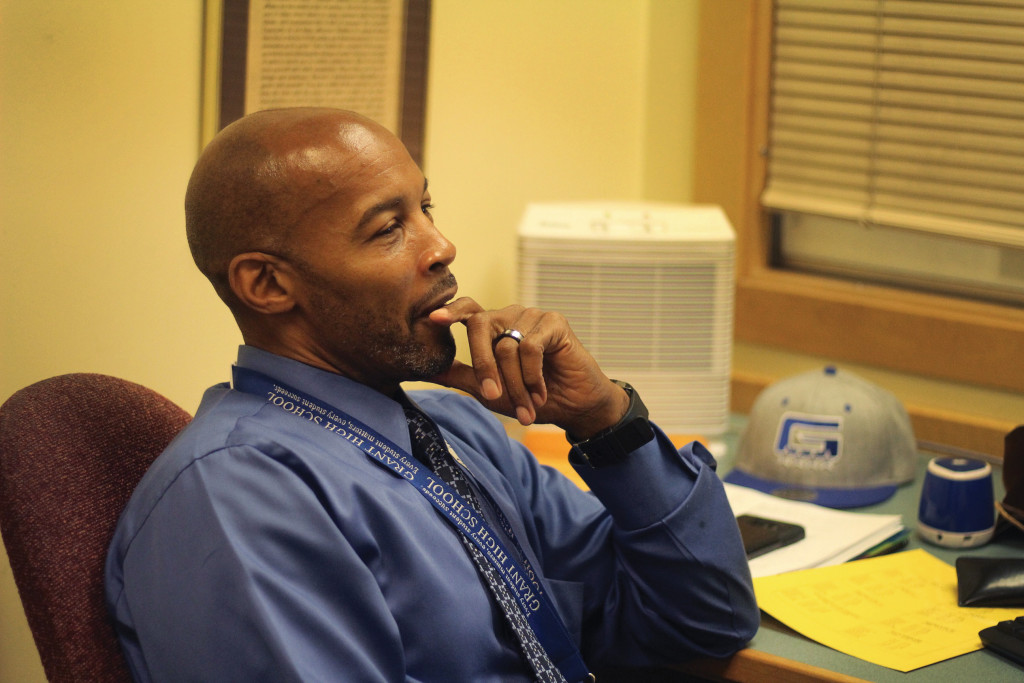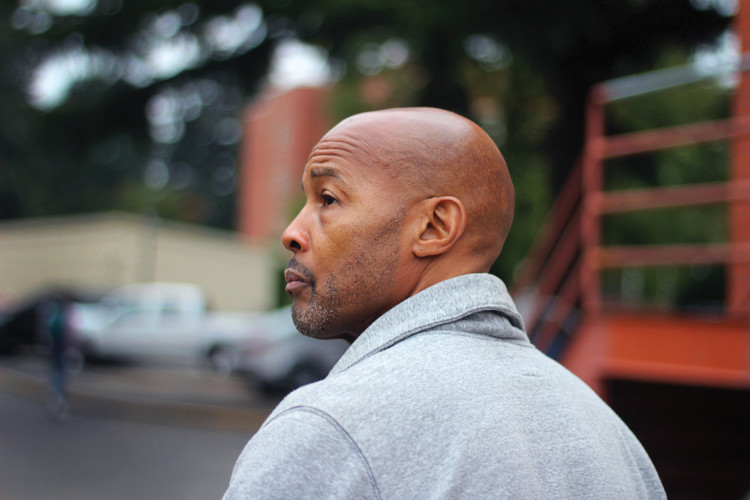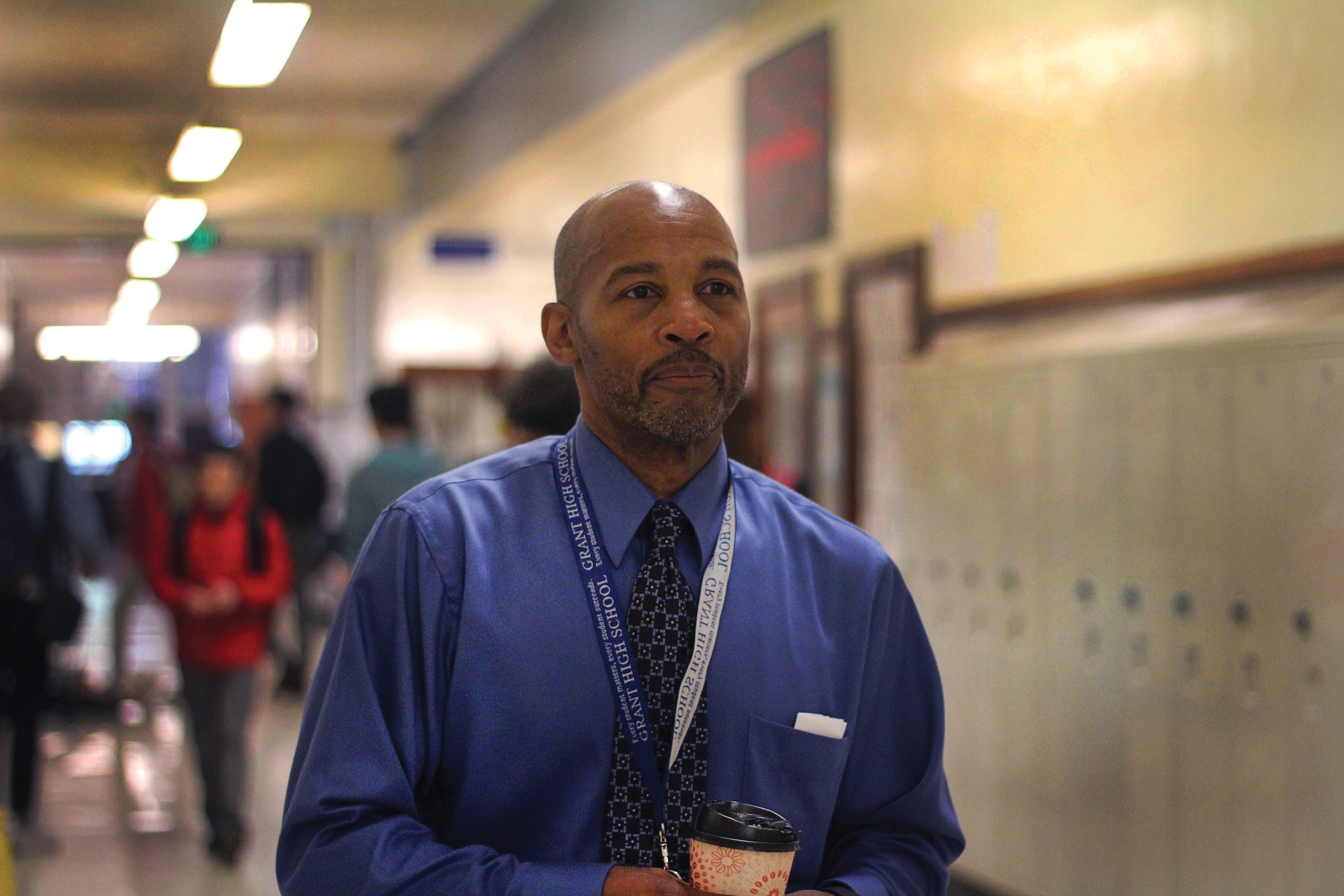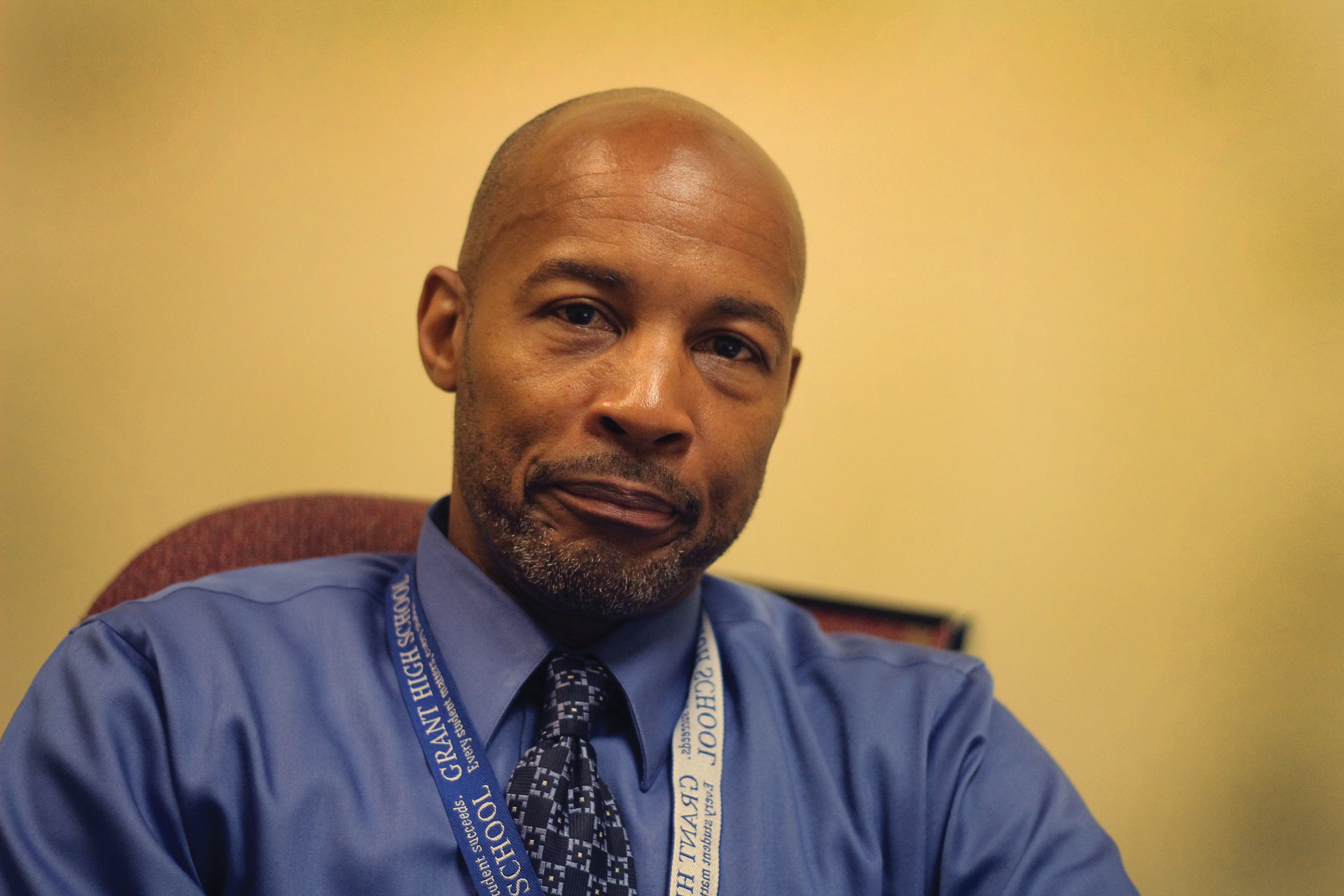It’s a little after 8 a.m. on a recent Tuesday, and Lee Orr is already hard at work. His day starts in a room tucked away in the counselors’ Office of Grant High School.
Orr, who’s official title is community agent but is known by most of the school as the attendance specialist, is leaving messages for parents of students who haven’t been at school lately. He introduces himself, expresses concern and tells them to call him back soon.
Then he hangs up, pops a peppermint candy into his mouth and is on the move, taking large strides down the hall while holding a clipboard with a list of students who have been chronically absent.
He’d normally wear dress shoes, but on this day he’s wearing boots so that he can easily get around the school. As he wanders down center hall, he’s greeted by students.
“Orr, what’s going on?” says one student.
“Get to class, man!” Orr calls out to another.
He circles the building three times in 30 minutes, stopping in classrooms to ask teachers in a hushed voice if certain students are in class. Most of the time the answer is no, but Orr’s not discouraged.
School has been in session for less than two months, but it’s clear that Orr has found his place.
Not everyone knows that he’s walked these halls before. He attended Grant in the late 1970s, but back then, he wasn’t exactly the charismatic go-getter he is now. Anxiety prevented him from attending classes, and his grades dropped. After only a little more than a year at the school, he dropped out.
“School anxiety for some students is real,” says Mary Krogh, an attendance case manager for the Portland Public Schools district. Mental health issues, along with poverty and family struggles, are some of the key reasons for poor attendance for students.
“Oregon as a whole… has not really been very consistent about responding to attendance and hasn’t been very focused on it,” says Krogh.
Attendance at Grant – about 30 percent of students have severe or chronic absences – isn’t an outlier compared to other schools, but Grant administrators still see room for growth. They want to get that down to at least 10 percent.
That’s where Orr comes in. In the past, there hasn’t been a full-time faculty member devoted to tracking attendance.
“We really felt like having a person full time dedicated to just looking at attendance is something we wanted to do,” says Grant Principal Carol Campbell. “Non-attendance is the number one thing that contributes to lack of success at school, more so than anything else.”
Grant Vice Principal Diallo Lewis puts it simply: “If you’re not here, you can’t learn,” he says.
But the focus of Orr’s job isn’t punishing students who skip class. Rather, Orr is leaning on a career working with youth and his own experiences growing up to design a different approach.
He forges connections with students through home visits and routine check-ins. He has the phone numbers of many chronically absent students and texts them regularly to check on their progress.
“I think the attendance specialist today is important,” says Orr, “because otherwise, there’s a lot more people that struggle and wouldn’t graduate. I don’t care if I’m liked. I just want people to feel comfortable and feel they can trust me.”
Orr was born in 1961 in Portland to his mother, Shirley Orr, who was 17 at the time. He is the oldest of four siblings, and his parents split up when he was young.
From the beginning, Orr, who went by his middle name, Anthony, was close with his mother. “She was my everything,” says Orr, who still calls her “mommy.”
When Orr was older, his mother went back to school to get her degree in nursing. Money became tight, and the family relied on public assistance and a local food pantry to get by. Orr still remembers the sense of shame he felt when the truck pulled up to their house to deliver bags of food. “It was tough, but she always made sure we had enough on the table,” he says.
When he wasn’t helping out at home, Orr was outside playing football, basketball or baseball in the streets with neighbors or siblings.
But Orr also had other interests he didn’t share with his peers, such as climbing trees, reading science books and flying paper airplanes. Today, he describes himself during childhood as “nerdy.”
“A lot of times I was by myself,” Orr says.
In school, he excelled academically. But when it came to interacting with others, he struggled.
That’s because he stuttered. Once, in elementary school, a teacher called on him to work on a problem at a board at the front of the class. Orr knew the correct answer, but when it was time to work it out, he froze.
Then, when he tried to answer, his tongue tied up and he couldn’t get the words out. Tears began to flow, and the class behind him erupted in laughter. “It always made me really hesitant to speak, that one experience,” says Orr. He rarely raised his hand after that.
As a freshman, he walked into Grant at only 4-foot-9, weighing 90 pounds. That, coupled with his stutter, made him an easy target for bullying.
Even though he loved basketball, he didn’t join Grant’s team because the coach at the time yelled at the players. Soon, Orr began cutting class.
Whenever his mother dropped him off in the morning, he’d wait in the hall until she drove away before slipping out the back door. He’d often sit alone in the Grant bowl before walking down Northeast Knott Street and heading back home.
He thought his mother didn’t see him. But Shirley Orr says she saw what her son was doing. “I did not know what the issue was,” she says now. “It was very, very frustrating.”
One of his only sources of refuge at school was his friend, Gil Flowers. They connected, says Orr, because Flowers was silly like he was, and Orr didn’t see him as threatening.
He remembers how Flowers would try to pull him toward the classroom door, but Orr always managed to let loose of his grip and lag behind.
“He would urge me,” Orr recalls. “He would get mad at me. ‘Come on, Anthony! Come on, man, let’s go to class!’”
During his sophomore year, Orr stayed at Grant long enough to get his school picture taken. Then, he dropped out. He tried two alternative schools in Portland but couldn’t find his place, the curriculums either too loose or too technical. After only a few months at each, he dropped out again, deciding to instead get his GED.
“Once I left (Grant), then I’m on this whole different path,” he says now. “I am the kid who takes the alternative path to education.”
After getting his GED certificate in 1979, Orr decided on his next step: the military. “I was lacking what most students had: discipline,” says Orr. “So the military gave me discipline.”
Orr was stationed at the U.S. Army’s Fort Leonard Wood in Missouri, where he was a telecommunications operator. It wasn’t long before Orr put on some size and became a leader in his platoon. “There is a camaraderie in the military that isn’t like any other,” says Orr. “I’m glad I did it because now I’m a member of a group.”

When Orr was 24 and had finished with the military, he began attending Lower Columbia College, a two-year school in Longview, Wash. There, he was the point guard on the basketball team, which was how he got to know Robert Key, who also played on the team.
“He was more like our leader,” recalls Key.
After graduating, Orr began working at a few local community centers and youth basketball teams in the Washington and Oregon area. Around that time, he got married and started a family.
He also worked in the mailroom for a Portland law firm, which propelled him to secure a degree in political science at Portland State University.
He then worked at a number of jobs that focused on helping at-risk youth. That included the Youth Employment Institute, a nonprofit in Northeast Portland where he worked as a case manager for students who were involved in the judicial system or teen parents that had dropped out of high school.
“They just needed someone that would speak to them with respect,” says Orr. “My role … (was) to give voice to that student.”
Things then started to fall apart for him. He and his wife divorced, and soon after, Orr became unemployed. For nearly two years, he couldn’t land a job. Without work, his meals mostly consisted of beans and rice, and he didn’t have heat during the winter.
“It was tough,” says Orr. “I wouldn’t go to relatives’ houses because I wouldn’t want them to see I needed anything. And then somehow … you can’t feel bad or sorry for yourself anymore, and you just try to recall that old strength that’s deep inside you.”
By sheer will, he built himself back up, landing work at Better People, an organization aimed at reducing criminal recidivism rates in Portland.
“I think my life is proof of what I’m trying to present; if you believe in yourself and you continue to push forward, not be fearful to show people your talents, then you’ll be successful,” he says.
Around that time, Orr reconnected with someone named Nikki Blackburn through a work event. When he saw her, he realized she was a familiar face. They had been neighbors growing up but hadn’t seen each other in around 30 years.
“I felt something so strong… that I just said I can’t believe I’m seeing this lady that I saw all these years ago,” he recalls.
They began dating, and in 2011, they married in Orr’s mother’s backyard.
“He’s very much in your corner of a fight,” says Blackburn. “He’s a protector; that’s something that I saw in him very early on.”
Orr landed a job in 2013 working with Metropolitan Family Service, an umbrella agency that works with community partners to help families overcome barriers. He managed after-school activities and helped with transportation support for families in the Reynolds School District.
While there, he received a call from Key, who had been named the Grant Boys Basketball coach in 2014. He needed some extra coaching help and wanted to know if Orr was up for the challenge. Without hesitation, Orr was in.
Entering the gym as an assistant coach that year was the first time Orr had been back at Grant since he was a student. He remembers having to hold back tears as he sat in the gym a few times. “I’m coming back to the high school where I failed, and I’m put in a position to be able to touch kids, young people … and I take that so seriously,” he says.
After beginning to coach, Orr quit his job to help coach full time on the team.
He built relationships with the players quickly, offering some rides to and from practices and taking the team out for meals after games.
“After practice, I told him I’m gonna stay longer, and then he stayed there longer with me,” says Ty Rankin, who played on the team last school year. “Whenever we needed something, he always helped us and did the best he can to give it to us.”
Seeing Orr interact with the team was how Vice Principal Diallo Lewis first took notice. “His commitment to forming relationships, getting to know them, while also holding them accountable, the way he communicated with students, staff and parents,” Lewis says, is what he appreciated about Orr.
It didn’t take long for Orr to decide he wanted to apply to work at the school. Lewis says Orr was easily the most qualified candidate for the attendance job.
Now, Orr’s goal is for Grant to have 100 percent attendance, something he doesn’t think is too lofty.
While data isn’t out yet on attendance rates for the current school year, administrators sense there’s been an improvement. Since the beginning of the school year, Orr’s scratched around 30 kids off his list of chronically absent students. That number sits at a little more than 100.
“Lee has a great personality and ability to reach out to families in a way that doesn’t feel punitive,” Campbell says. “To me, it feels like he has taken on ownership of this particular piece of getting students to school.”
Students, too, are feeling the difference.
It was only a few days into the school year that he met Evan Bladow, a senior who, because of a self-described lack of confidence around school work, had a spotty attendance record at Grant.
After a visit to Bladow’s home the first week of school, they developed a rapport. Orr texts him “good morning” at the beginning of every school day and offers him a ride to school if he needs it.
“He’s like someone I will always look up to and like always remember … he’s been there for me,” says Bladow, who, like most students, calls Orr “Mr. Lee.”
“Just making sure I’m getting to school,” Bladow says. “If he didn’t, I probably just wouldn’t come.”
On a recent school day, Orr is driving around Northeast Portland to visit the homes of students who’ve been missing class.
He walks up to countless doors, knocks and waits. If no one answers, he heads back to his car to send the student a text.
On the drive back to school, Orr is in a good mood because the mother of a student he hadn’t been hearing from lately finally texted him back. Her child had made it to school on time that day.
“That made my day,” Orr says.
Now, after years of moving around, Orr says that he’s ready to settle in and dive deep into his new job.
“I feel like my journey now is complete,” he says. “I found that young kid again. I found him, and I brought him along with me. He doesn’t have to hide or slip out the back door anymore.” ◆








5OOXG43F0Y http://www.yandex.ru